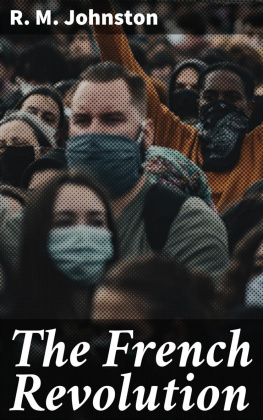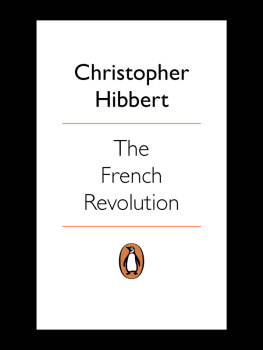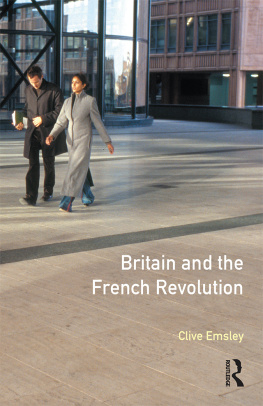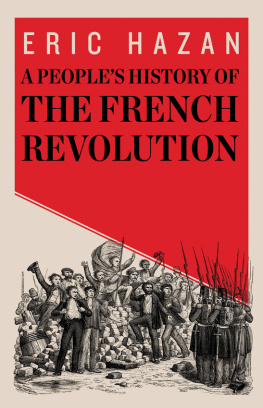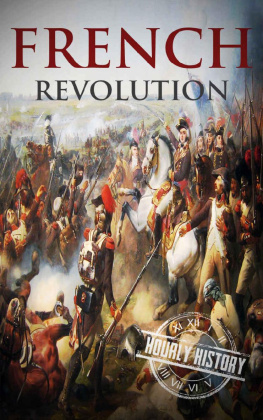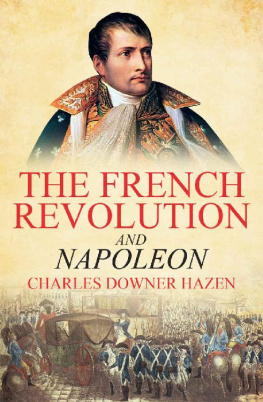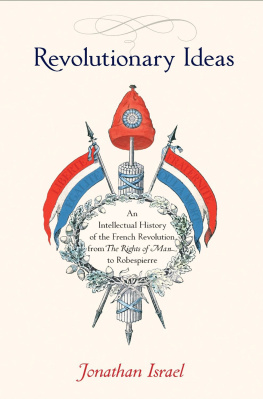The French Revolution
Debate in English
Literature and Culture
Recent Titles in
Contributions to the Study of World Literature
- Reflections of Change: Children's Literature Since 1945 Sandra L.Beckett
- Nordic Experiences: Exploration of Scandinavian Cultures Berit I.Brown, editor
- Catholic Fiction and Social Reality in Ireland, 1873-1922 James H.Murphy
- A Morbid Fascination: White Prose and Politics in Apartheid South Africa Richard Peck
- The Other Mirror: Women's Narrative in Mexico, 1980-1995 Kristine Ibsen, editor
- Searching for Recognition: The Promotion of Latin American Literature in the United States Irene Rostagno
- James Merrill's Poetic Quest DonAdams
- Sounding the Classics: From Sophocles to Thomas Mann Rudolph Binion
- Homeric Rhythm: A Philosophical Study Paolo Vivante
- Virginia Woolf: Feminism, Creativity, and the Unconscious John R. Maze
- Jane Austen and Eighteenth-Century Courtesy Books Penelope Joan Fritzer
The French Revolution
Debate in English
Literature and Culture
Edited by
LISA PLUMMER CRAFTON
Contributions to the Study of World Literature, Number 87
GREENWOOD PRESS
Westport, Connecticut London
Library of Congress Cataloging-in-Publication Data
The French Revolution debate in English literature and culture / edited by Lisa Plummer Crafton.
p. cm.--(Contributions to the study of world literature, ISSN 0738-9345; no. 87)
Includes bibliographical references and index.
ISBN 0-313-30496-3 (alk. paper)
1. English literature--French influences. 2. France--History-- Revolution, 1789-1799--Literature and the revolution. 3. France-- History--Revolution, 1789-1799--Foreign public opinion, British. 4. English literature--19th century--History and criticism. 5. English literature--18th century--History and criticism. 6. France--In literature. I. Crafton, Lisa Plummer, 1956- . II. Series.
PR129.F8F74 1997
820.9358--dc21 97-13719
British Library Cataloguing in Publication Data is available.
Copyright 1997 by Lisa Plummer Crafton
All rights reserved. No portion of this book may be reproduced, by any process or technique, without the express written consent of the publisher.
Library of Congress Catalog Card Number: 97-13719
ISBN: 0-313-30496-3
ISSN: 0738-9345
First published in 1997
Greenwood Press, 88 Post Road West, Westport, CT 06881
An imprint of Greenwood Publishing Group, Inc.
Printed in the United States of America
+
The paper used in this book complies with the Permanent Paper Standard issued by the National Information Standards Organization (Z39.48-1984).
10 9 8 7 6 5 4 3 2
Contents
- Acknowledgments
- Introduction
- Chronology
- Burke's Perception of Richard Price John Faulkner
- Religion and Politics in the Revolution Debate: Burke, Wollstonecraft, Paine Patricia Howell Michaelson
- The "Ancient Voices" of Blake's The French Revolution Lisa Plummer Crafton
- Arguing Benevolence: Wordsworth, Godwin, and the 1790s Evan Radcliffe
- "Great Burke," Thomas Carlyle, and the French Revolution Lowell T. Frye
- Politics of the Episteme: The Collapse of the Discourse of General Nature and the Reaction to the French Revolution Paul Trolander
- Representations of Revolutionary Women in Political Caricature Jane Kromm
- Postscript: The French Revolution and Romanticism David Bromwich
- Select Bibliography
- Index
- About the Contributors
Acknowledgments
The original works in this volume all owe debt to the National Endowment for the Humanities and to David Bromwich at Yale University, who directed the 1991 NEH Summer Seminar on "The Revolution Debate and English Literature of the 1790s." Like all the contributors, I thank the NEH and Professor Bromwich for this exciting intellectual endeavor.
My work on this volume was made easier by collegial advice from all the contributors and has been particularly aided by my colleagues in the English Department at the State University of West Georgia. I wish to especially thank my colleague and chair, Robert Snyder, for release time to complete and edit this collection and my graduate research assistants Amy Faulds and Mitzi McFarland for their assistance during various stages of this work.
As always, I thank my family and friends for support and encouragement.
Introduction
Lisa Plummer Crafton
It may not be exaggerated to say, as did the LondonCorresponding Society in 1789, that the debate in England over the French Revolution was the topic to which "all thinking minds were drawn" during the decade of the 1790s. Certainly, the effects of the French Revolution upon English culture in the last decade of the eighteenth century has been a topic to which many scholarly minds have been drawn in the late twentieth century, especially during the last ten years. Romantic studies in particular have served to interpret the alliance between the Romantic movement and the Revolution since at least M.H.Abrams 1963 essay "The Spirit of the Age."Abrams's thesis has had such impact that recently Abrams noted that his speculations have become attributed to him as almost a formula for defining Romanticism. Responding to such reductionism, Abrams reaffirmed his point by quoting from the original essay: "I do not propose the electrifying proposition that 'le romantisme, c'est la revolution.' Romanticism is no one thing. It is many very individual poets, who wrote poems manifesting a greater diversity of qualities it seems to me than those of any preceding era." That being said, Abrams goes on to reaffirm his belief that the complexities of the Revolution of 1798 clearly shaped intellectual and imaginative discourse.
More recent evidence of the continuing interest in the interrelationships between this phenomenal historical event and a range of intellectual and cultural disciplines, literature in particular, came in the form of three scholarly meetings in the United States (as well as four significant bicentennial conferences in England in 1989-1990) in the past nine years: the Indiana Symposium on Romanticism, held in February 1988 in conjunction with "William Wordsworth and the Age of English Romanticism," a highly praised exhibit which emphasized "The Age of Revolutions"; the 1990 conference "Revolutionary Romanticism 1790-1990," a Bucknell University meeting sponsored by the Wordsworth Trust America; and the National Endowment for the Humanities 1991 Summer Seminar at Yale University, "The Revolution Debate and Literature in the 1790s." Directed by David Bromwich, this seminar went much further than the conferences in examining the phenomena of the Revolution debate as a network of cultural influences that affected and shaped not only history and literature but also philosophy, political theory, art, economics-in short, a vastly interdisciplinary cultural event. The kind of investigations and analyses within the scope of the NEH seminar and of more interest in the last five years risks being undervalued because of the almost clichd nature of the theory that the French Revolution-- in its urge for democratic reform, its ideals of liberty, equality, and fraternity-- represented the optimistic impulses of mankind in the fin de sicle of the eighteenth century. The alliance between the Romantic exaltation of this period--lines like Wordsworth's "Bliss was it in that dawn to be alive" exemplify--and the new hopes for political and economic equality (seen in Paine, Godwin, Wordsworth) ensure that both literature and political theory see the Revolution as a watershed date in their histories. But there is much danger in accepting the clich without fully examining and understanding both what influenced and shaped the discourse of the debate and its effects, especially after the Revolution's violent turn of events and the declaration of war between England and France in February 1793. It still remains to be understood that the Revolution was not simply a background or an influence on cultural history but rather, as Raymond Williams said in 1958, "the mould in which general experience was cast."
Next page

